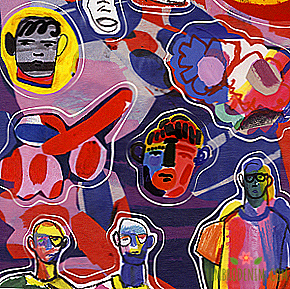Hidden photography in the toilet: Why a culture of violence can not be silent

Alexandra Savina
Last weekend, the Russian Facebook circled the post Muscovite Polina Anisimova: the girl said that she was the victim of a voyeurist who installed hidden cameras in the toilet of a Moscow coffee shop. This was reported to her by a stranger who found her on VKontakte (apparently, through the FindFace service or his equivalents) to warn about the voyeur, from whose actions his relatives also suffered. The actions of the voyeurist are subject to article 137 of the Criminal Code - "Violation of privacy". However, despite the obvious illegality of his actions, many questioned the veracity of the words of the victim - this often happens in cases of harassment and violence. But the story of Polina Anisimova, alas, is far from unique: the girl discovered that it was easy to find archives with hundreds of similar records on the Web. And that is why it is so important not to close our eyes to this situation and talk openly about the problem.

As in all such situations, not only the incident itself is important, but also the reaction of society: it, like a litmus test, helps to reveal a whole bunch of problems. Many do not believe Polina Anisimova: the situation is called another urban scare, they consider it the actions of competitors of the coffee house, hidden advertising of the FindFace application, and even PR. The self-defense mechanism works: we hope that this will never happen to us, and we convince ourselves that this could not happen in principle that "normal people" do not face this.
It does not help how the situation is covered in the media: even in neutral news notes, phrases like "videotapes or other evidence of the existence of hidden video cameras are not provided." Similar claims are often voiced to victims of violence: it is believed that a girl who has experienced immense humiliation should immediately recover, collect evidence and go to the police - otherwise she is not telling the truth and just trying to "defame a decent person." The editors of Life.ru went even further: after the girl refused to cooperate, the editors published a video (at the time of writing this text, it was, however, already removed), violating the law on privacy and acting contrary to journalistic ethics.

It is believed that the girl who survived the humiliation should quickly recover, gather evidence and contact the police
The situation that occurred with Polina Anisimova is not unique - a quick search allows you to find dozens of resources that publish similar content and specialize in relevant porn genres. Voyeurism is not a purely Russian problem: high-profile cases occur in the UK, in Japan, and in the United States. Criminals do not always get punished: for example, Massachusetts law allows photographing dressed people without their knowledge - the court could not make a complaint to a man from Boston who took a picture under an unfamiliar woman’s skirt, since a woman in a skirt is formally considered fully dressed. There is a place for the criminal and for the accusation of the victim: the voyeur is forgiven because he simply "could not resist" at the sight of a beautiful girl, and women are accused of carelessness and levity, which allegedly lead to problems.
All these are particular manifestations of the so-called rape culture, a culture of violence in which a consumer attitude towards women is developed and encouraged: it is perceived as an impersonal object, intended only to satisfy men's needs. This is a demonstration of power and power: the voyeur is in complete control of the situation, its further development and the fate of the victim, because it depends on him whether pictures or videos will be published and how many people know about them.

The virtual space makes us especially vulnerable: the boundaries of the personal and the public on the Internet are becoming blurred, and our personal space is increasingly being invaded. For example, the FindFace service, which the stranger used to search for Polina Anisimov online and tell her about the voyeur, was already used for harassment on the Internet - with the help of it, the users of the “Dvach” imageboard found on social networks of Russian porn actresses and started uploading their real names and photos to the Network . It seems that almost every second person is facing harassment in social networks and dating applications. The anonymity of the Internet gives a feeling of complete freedom and impunity: it seems to the criminal that he will never be recognized, and the victim thinks that he cannot find the attacker and charge him, that they will not believe her, and that her arguments will not convince anyone.
At first glance, the story of Polina Anisimova may seem insignificant and shallow - it seems that this is a special case, a terrible story that has nothing to do with ordinary life. But if we do not pay attention to such cases in time, this can create prerequisites for more serious actions and problems, as it fixes in our mind a certain attitude towards violence and violation of foreign borders.

Voyeur forgive for the fact that he simply "could not resist" at the sight of a beautiful girl
This is evidenced by the growing problem of revenge porn - situations where one of the partners, after parting in a fit of revenge, uploads intimate photos and videos of the former partner to the Network. Ways to deal with such crimes are still poorly developed: by no means in all US states do the police have the skills and resources to combat revenge porn - let alone Russia, where there is not even an established Russian-language name for this phenomenon. But the problem cannot be solved only by punishing the criminal: pictures and videos of the victim can scatter on the web and be on well-known porn sites. Moreover, very often in such situations the society condemns the victim himself. It’s hard to imagine a situation in which the victim of a robbery will be told: “Do not start expensive jewelry if you don’t want to be stolen” - but this is what often happens with victims of revenge porn - it’s not the person who grossly violates the individual’s right to blame for the crime. life, and the one who made the bare selfie.
The culture of violence is also manifested in street harassment. Many consider street harassment to be a far-fetched problem, but in reality it’s still the same demonstration of power and authority, still the same person’s impersonation and its transformation into a sexual object. All these unlike at first glance problems - unpunished voyeurism, revenge porn and harassment - are united not only by a gross violation of the right to privacy, but also by neglect and disrespect for the victim. You shouldn’t repeat as a mantra “this will never happen to me” - instead you need to understand that this happens not only with abstract “others” and try to see the reason - a culture that encourages women to be perceived as an object and encourages this attitude. We need to respond to calls for help and talk openly about difficult situations that we want to dismiss, because it is impossible to solve the problem without discussing it.
Photo: Juris Sturainis - stock.adobe.com




